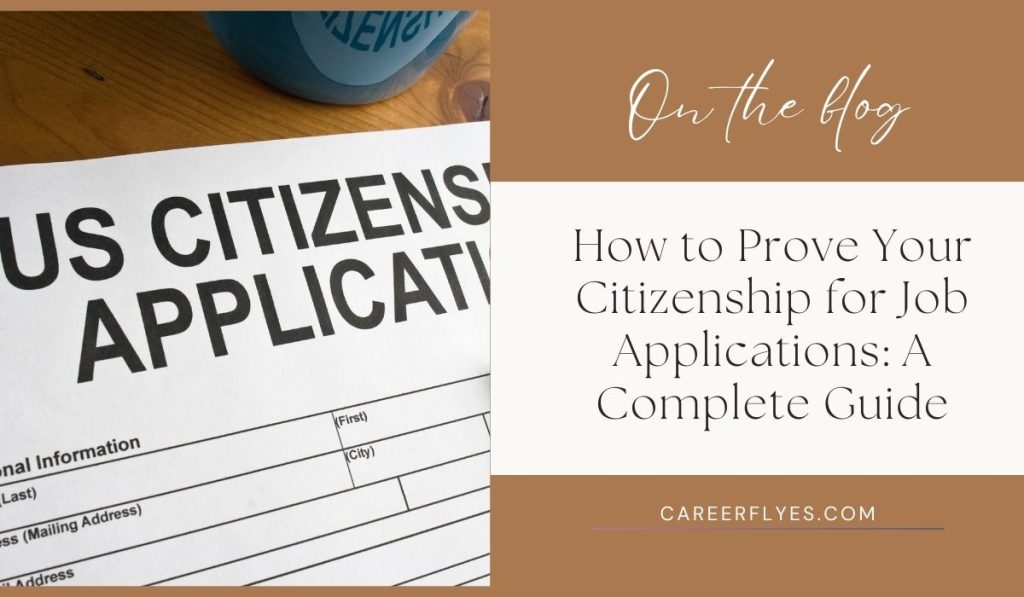How to Prove Your Citizenship for Job Applications: A Complete Guide
3 min read
Proving citizenship is a common challenge for job seekers. Verifying your citizenship is essential because employers must comply with legal requirements and ensure candidates meet job eligibility criteria. This guide provides an overview of the necessary documents, how to gather them, and how to ensure their authenticity.
Part 1: Understanding Citizenship Requirements

Before applying for a job, it’s important to understand why employers ask for proof of citizenship.
Why is citizenship verification necessary?
- Legal compliance: Employers must verify a candidate’s citizenship or immigration status to comply with federal and state laws.
- Job eligibility: Some positions, especially in government or those requiring security clearance, have specific citizenship requirements.
- Security and privacy: Verifying citizenship helps employers protect sensitive information and avoid legal issues from improper hiring.
Part 2: Common Citizenship Documents
To prove your citizenship, you’ll need to provide one or more official documents. Below are the most commonly accepted forms:
Essential Documents:
- Birth certificate: Confirms your date and place of birth, often the first document requested.
- Passport: A government-issued passport is widely accepted as proof of citizenship.
- Green card: If you’re a permanent resident but not yet a citizen, a green card proves your lawful right to work in the U.S.
- Naturalization certificate: This document serves as proof for those who have become U.S. citizens after birth.
Additional Documents:
- Driver’s license: May be accepted as supplemental ID, but not as standalone proof of citizenship.
- Social Security card: Used as supporting evidence, not primary proof.
- School records: Helpful for younger applicants but rarely used as standalone documents.
Part 3: Gathering Necessary Documents

Make sure you have the required documents before applying for a job.
Steps to gather documents:
- Check job application requirements: Review the job posting to identify which documents are needed.
- Contact government agencies: If you don’t have key documents, request them from the appropriate agencies. For example, you can get a birth certificate from the state’s vital records office.
- Organize your documents: Keep both physical and digital copies for easy access during the application process.
Part 4: Verifying Document Authenticity
Employers may want to confirm the authenticity of your documents. Here’s how to ensure your documents are legitimate.
Steps to verify authenticity:
- Check for security features: Look for watermarks, holograms, or microprinting on official documents.
- Use online verification tools: Some government agencies provide tools to verify documents like passports and birth certificates.
- Consult immigration experts: If you’re unsure about a document’s validity, seek professional advice.
Part 5: Providing Citizenship Proof
Once your documents are ready, it’s important to submit them correctly and prepare for possible additional verification.
How to submit your proof:
- Submit documents with your application: Follow the employer’s instructions for submitting documents, whether digitally or physically.
- Be ready for further verification: Employers may request more documents or information, so keep backup copies.
- Understand delays: Some verifications, especially for international applicants or government roles, may take extra time.
Part 6: Addressing Common Challenges
Job seekers may encounter obstacles when trying to provide proof of citizenship. Here’s how to address common challenges:
- Lost or damaged documents: Explain the situation to the employer and contact government agencies to replace missing documents.
- Difficulty obtaining documents: Seek help from relevant government offices if you’re struggling to get the required documents.
- International applicants: Research work permits, visas, and other specific requirements. If needed, consult an immigration expert for help with paperwork.
Conclusion
Providing proof of citizenship for job applications is a crucial part of the hiring process. Understanding what documents are required, gathering them in advance, and verifying their authenticity can help you avoid delays and demonstrate your eligibility. Stay proactive, and don’t hesitate to seek assistance if you encounter challenges.
Proactive preparation: Gather your documents early to avoid last-minute issues.



